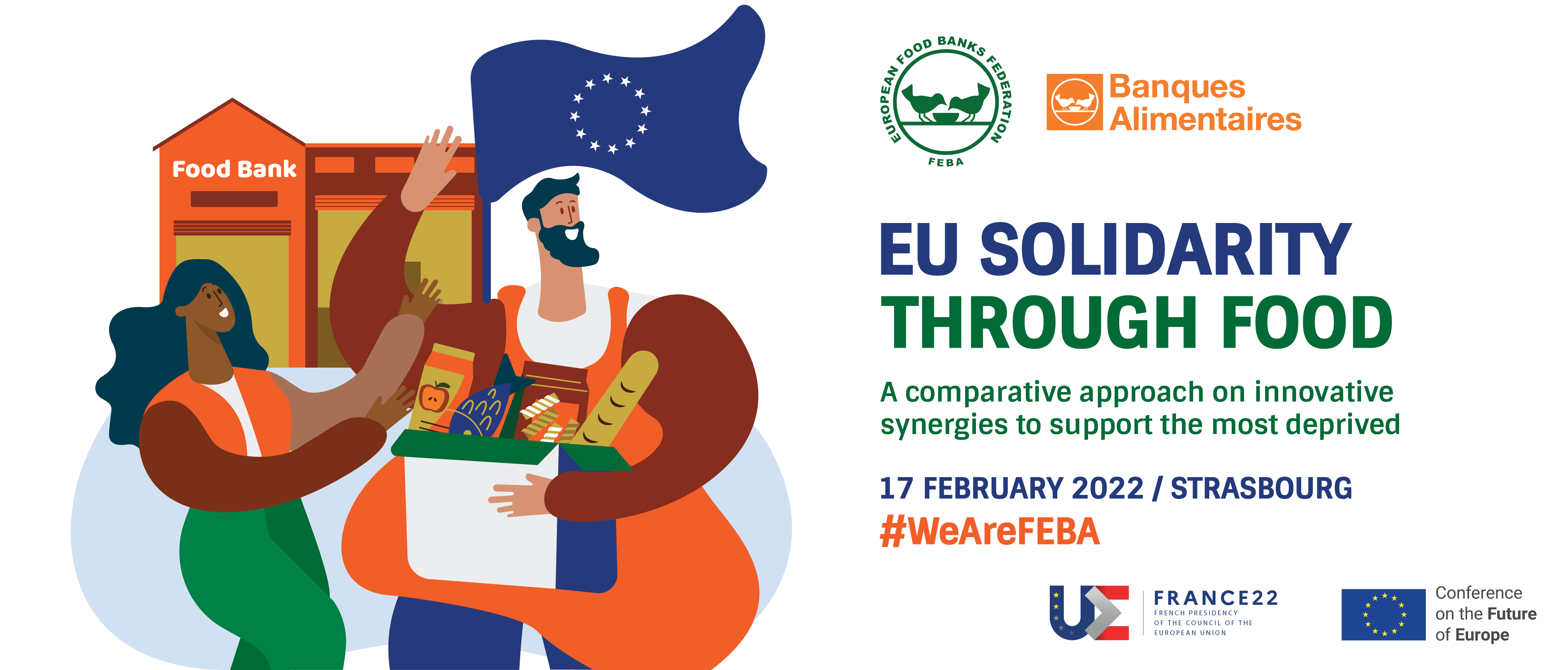
The European Food Banks Federation (FEBA) and the Fédération Française des Banques Alimentaires are jointly organising the conference “EU solidarity through food – A comparative approach on innovative synergies to support the most deprived” in Strasbourg (France) on 17 February 2022 in the context of the French Presidency of the Council of the European Union (1 January 2022 – 1 July 2022).
The intention is to arrange the event under the umbrella of the Conference on the Future of Europe in order to contribute with results to its objective and provide guidance on the tackling of future challenges and exploitation of opportunities related to food aid for the most deprived.
Different experiences and best practices will be shared from a range of EU Member States on innovative and efficient ways to create synergies between different EU funds. For this reason, the conference will bring together representatives from European institutions as well as French authorities, FEBA Members, and other stakeholders, to foster the dialogue and shape resilient partnerships for the benefit of communities and vulnerable groups.
Welcome and opening remarks
European and national comparative approaches
Round table
Conclusions

A multilingual world citizen, Christina is a presenter-journalist for international events. She speaks several languages, works in France and worldwide on any type of event such as conventions, congresses, conferences, round tables, but also for broadcasts, interviews with leaders, institutional videos, in person, remotely, hybrid or TV formats. In addition, as CEO of Clap Com’, Christina and her team use their experience on stage, as actors and improvisers, to provide training and coaching in oral and behavioural communication.
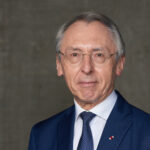
At the end of the General Assembly of June 24, 2020, Claude Baland was elected President of the Food Banks network by the Board of Directors of the French Federation of Food Banks. 5th President since the creation of the network in 1984, he joins the French Federation of Food Banks for a three-year term, renewable once. Claude Baland began his career as a primary school teacher and then as a history and geography teacher in secondary school in the Nièvre region. Between 1987 and 2014, Claude Baland held various positions in the prefectural administration. In 1999, he was Prefect of the Gers and then successively of the departments of Meurthe et Moselle, Seine-Saint-Denis and Hérault. He became Prefect of the Languedoc-Roussillon region in January 2009. In 2001, he was appointed Director of the Administration of the National Police and then Director General of the National Police (DGPN) in 2012. In 2015, he joined the Renault Group as Director of Ethics and then Director of Audit, Risks and Ethics in 2019. Claude Baland holds an agrégation in geography and a master’s degree in geography as well as a bachelor’s degree in history. He is a graduate of the Ecole Nationale d’Administration (ENA) “Solidarité” class (1983).

Following his studies at the IEP of Paris, the College of Bruges (class of 2005), and the ENA (class of Willy Brandt), Clément Beaune began his career in 2009 at the Budget Directorate, as deputy head of the finance laws office. From 2012 to 2014 he joined Jean-Marc Ayrault’s cabinet as budget advisor. Following a brief stint at the EUPR in Brussels, he joined the cabinet of Emmanuel Macron, Minister of the Economy, in 2014 as European Affairs Advisor.
Between 2016 and 2017, he joined the Aéroports de Paris – Management group as Deputy Managing Director. Following the election of Emmanuel Macron in 2017, he joined the cabinet of the President of the Republic at the Elysée Palace as European Affairs Advisor.
On 26 July 2020, he was appointed Secretary of State for European Affairs to the Minister for Europe and Foreign Affairs in the Jean Castex government.

Piet Boerefijn was born in 1963 in Woerden, the Netherlands. He studied Human Geography at Utrecht University. In 1993, he wrote a Master’s Thesis about Estonian economic and regional development. Since 1995, he is the Estonian representative for Cooperating Netherlands Foundations for Central and Eastern Europe.
In 2010, Piet Boerefijn, together with Leni van der Meer established Toidupank, the Estonian Food Bank. Today the network is made of 15 Estonian Food Banks.

Pedro Castaños was born in Bilbao in 1956. He owns an Engineering degree , MBA and degree in History. He has experience in the Media and Distribution Sector with experience as CEO and Chairman of SGEL, distributor of press and books. Pedro volunteers as International Relationship Manager for FESBAL since 2017.
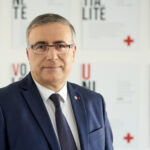
Philippe DA COSTA, 59 years old, was elected President of the French Red Cross on 10 September 2021 after having been National Secretary since 2017. He has been involved in the French Red Cross since he was 17 years old. He is married and has three children.
He has a doctorate in education sciences from the Université Lumière Lyon 2, is a graduate of the Institut supérieur de gestion, and is an auditor of the Institut des Hautes Études de la Défense Nationale (IHEDN) and the Institut des Hautes Études de la Protection Sociale (IHEPS). He began his career in 1988 as head of youth and sports policy in the Doubs department before heading the Scouts de France and then joining the French Red Cross as National Director of Associations. At the same time, he held various associative mandates, including the presidency of the Conférence Permanente des Coordinations Associatives (Mouvement associatif) from 1996 to 1998 and the presidency of World Scouting from 2007 to 2008. In 2011, he became Advisor to the Chairman of the Macif Group and then, in 2014, Deputy CEO. In 2018, he joined the AG2R LA MONDIALE Group as a member of the Executive Committee before joining the Group Management Committee in 2019.
Philippe DA COSTA is Secretary of the Economic, Social and Environmental Council (EESC) and member of the Health and Citizenship Group. He is also President of the Scientific and Orientation Council of the National Institute for Youth and Popular Education (Injep).
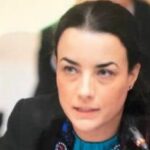
Since 15.08.2020, H.E. Ambassador Céline Jurgensen is the Permanent Representative of France to the United Nations in Rome.
She joined the Quai d’Orsay in 2003, then moved to the Legal Affairs Directorate where she was in charge of environmental issues and the European Union’s Common Foreign and Security Policy.
From 2008 to 2010, she was in charge of negotiations on the Treaty on the Non-Proliferation of Nuclear Weapons in the Directorate for Strategic Affairs, Security and Disarmament. Her appointment to the Permanent Mission of France to the United Nations took her to New York from 2010 to 2012, then she was successively, from 2012 to 2014, Deputy Director in charge of strategic affairs at the Ministry of Defence, from 2014 to 2016, Deputy Director of Human Rights and Humanitarian Affairs at the Directorate of the United Nations, International Organisations, Human Rights and Francophonie, and from 2016 to 2020, Director of Strategy at the Directorate of Military Applications of the French Atomic Energy and Alternative Energies Commission.

Virginie Lasserre’s initial training and career path have enabled her to have a diversified and operational approach to the implementation of public policies, moving from State action in the territories to central administration, without forgetting local authorities and an international NGO.
She graduated from the Institut d’Etudes Politiques de Bordeaux (1991), and the following year obtained a DEA in Social Anthropology at the EHESS, as well as the Liotard Prize for her ethnological expeditions in Irian-Jaya (Indonesia).
She started her career in 1992 in the Humanitarian Action Department of the French Ministry of Foreign Affairs and then at Médecins du Monde. In 1996, she became head of the City Policy offices of the Val-d’Oise and Val-de-Marne prefectures and in 2004, she became deputy director of solidarity, educational and family actions and urban renewal at the Athis-Mons town hall (in the Essonne region).
From 2008, she was an advisor to the Mayor of Paris in charge of urban policy, integration, the fight against discrimination, human rights, gender equality and youth. In 2012, she was appointed sub-prefect of Château-Thierry (in the Aisne) and then sub-prefect in charge of economic development in the Hauts-de-Seine. She then headed the Migrants Unit at the Délégation Interministérielle à l’Hébergement et à l’Accès au Logement (Interministerial Delegation for Housing and Access to Housing) before becoming head of the department for the reception of asylum seekers and refugees at the DGEF of the Ministry of the Interior in 2017.
Virginie Lasserre is, since September 2019, Director General of Social Cohesion (DGCS).

Aoibheann O’Brien is co-founder and Partnerships Director of the award winning social enterprise FoodCloud. Founded in 2013, FoodCloud vision is for a world where no good food goes to waste. FoodCloud have established two national solutions for food redistribution in Ireland – a network of three food banks that redistribute large quantities of surplus food across Ireland and a technology solution that connects retailers directly to local charities. FoodCloud’s technology is also being used in the UK and Central Europe to support similar organisations to grow their impact.
Aoibheann was the recipient of the Social Entrepreneurs Ireland Impact award and Green Entrepreneur of the Year in 2014. In 2017, Aoibheann received the EY Entrepreneur of the Year Special Achievement Award and was named the overall winner of the IMAGE Businesswoman of the Year Award. In 2018 she also received a Humanitarian Award from the Irish Red Cross.
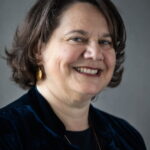
As economist, Ruth Paserman joined the Commission in 1993. She has since worked in a number of services: Eurostat, DG Employment and Social Affairs, DG Competition, DG Enterprise and Industry. She was also member of cabinet of Vice-President Tajani, Vice-President Dombrovskis and deputy Head of Cabinet of Commissioner Thyssen. Since November 2020 she is Director for Funds Programming and Implementation in DG Employment, Social Affairs and inclusion. She is responsible for the legislation, policy development and coordination of implementation of the funds managed by the DG (ESF+, EGF, Invest EU social window), as well as for the social economy and better regulation.

Constant REIBEL has been the volunteer President of the Bas-Rhin Food Bank since 2018 and a member of the Board of Directors of the French Federation of Food Banks. He was also President of the International Association of Friends of Tomi Ungerer. Former Mayor of Duttlenheim, he worked for the development of bilingualism in schools.
Professionally, he was an executive in a French banking group. He graduated from the Institut d’Etudes Politiques de Paris and holds a degree in mathematics and a degree in economics.
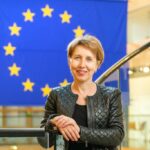
Born on 1 October 1973, in Haguenau in Alsace, Anne Sander has a doctorate in Economics from the University of Strasbourg. She has been a Member of the European Parliament since May 2014, and is the first Quaestor of the European Parliament since July 2019. She is a full member of the Committee on Agriculture and Rural Development and a substitute member of the Committee on Employment and Social Affairs.
Vice-president of the Fédération Les Républicains du Bas-Rhin, she is affiliated to the European People’s Party – EPP group. In addition to her parliamentary activities, she is particularly involved in cross-border cooperation issues, creating a parliamentary working group in 2014, and is strongly committed to defending the seat of the European Parliament in Strasbourg. She is also a Regional Councillor for the Grand Est since June 2021.

Sabine Thillaye is a Member of Parliament for the 5th constituency of Indre-et-Loire, Chair of the European Affairs Committee of the National Assembly and member of the Defence and Armed Forces Committee. As co-chair of the Franco-German working group for a new Elysée Treaty, she also works to deepen parliamentary relations between the two countries. As vice-president of the information mission on the follow-up of the Brexit negotiations and the future of the European Union’s and France’s relations with the United Kingdom, she is also interested in the various impacts of Brexit on the daily life of the French and Europeans. Sabine Thillaye studied at the Faculty of Law of the Westfälische Wilhelms-Universität Münster and International and European Law at the Université François Rabelais in Tours. Prior to her election, she was co-manager of a communications and signage company for thirty years, and a member of the Board of Directors of MEDEF Touraine; functions that have enabled her to gain a good understanding of the problems associated with companies and VSEs. A Franco-German and a convinced European, Sabine Thillaye is also a committed citizen. Founder of the Europe Val de Loire association, she was also president of the Maison de l’Europe de Tours Centre Val de Loire from 2000 to 2014 and is involved in the European Movement France. She is also a member of the Board of the Franco-German Cultural Centre of Touraine.
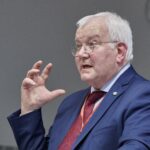
Born in Belgium, Jacques achieved a Master’s degree in Hospital Sciences from the Université Libre de Bruxelles. He started his career working for the European Development Fund in Somalia. Back in Belgium, he fulfilled the role of hospital manager and then accepted to lead the HR department of a large industrial group in South Africa. There, he founded his own business specialised in the development of antiseptics.
During the 25 years in South Africa, Jacques was the Honorary Consul of Belgium for the Eastern Cape where he had the opportunity to meet Nelson Mandela.
In 2007, he returned to Belgium and became acquainted with the local Food Banks. He became President of the Food Bank in Tournai and was asked to hold the Vice-presidency of the Belgian Food Bank Federation. After replacing a member of the Board of Directors of the European Food Banks Federation (FEBA), in October 2016 he was requested to assume the presidency of the organisation. Elected in May 2018, he is the current President of FEBA and plays an important part in the profound transformation of this organisation.

Irène Weiss is a regional councillor for the Grand Est region. A 23 year old Strasbourg native, Irène studied law at the University of Strasbourg and is currently pursuing a master’s degree in Business School. At the region, she is vice-president of the Higher Education, Research and Innovation Commission. She is also a member of the commission in charge of youth, sport, citizenship and commitment. Involvement in associations has always been important to her and she became involved at a very young age, in parallel with her activities.
The European Food Banks Federation (FEBA) is a European umbrella non-profit organisation and works in collaboration with 24 Full Members and 6 Associate Members in 30 European countries.
Since 1986 FEBA mission has consisted in representing its membership at European and international level, supporting and strengthening Food Banks in Europe by providing training, sharing best practice and knowledge, and developing partnerships, and fostering the creation of new Food Banks. FEBA brings together a network of Food Banks which are committed to prevent food waste and to reduce food insecurity.
In 2021, the 341 Food Banks belonging to our membership redistributed 907,280 tonnes of food to 45,810 charitable organisations providing food assistance to 11.8 million most deprived people thanks to the professionalism of 39,781 co-workers (83% volunteers).
In addition to surplus food from the food supply chain, FEBA members also redistribute food from the Fund for European Aid to the most Deprived (FEAD) and the Fruits and Vegetables withdrawal scheme, as well as from individual and corporate food collections.
The 79 French Food Banks are the leading national food aid network in France. Every year, they collect almost 112,500 tonnes of food throughout the country. These collections are made from supermarkets, the food industry, farmers and the general public, with the support of the European Union and the State, and are distributed to a network of more than 6,000 associations, social grocery shops and partner CCAS (Community Social Action Centres).
Each year, the Food Banks distribute the equivalent of 225 million meals, of which 2.8 million are provided by the Fund for European Aid to the Most Deprived (FEAD). The diversity of supply sources allows the Food Banks network to provide healthy, quality and diversified food aid.
Funded by the European Union. Views and opinions expressed are however those of the author(s) only and do not necessarily reflect those of the European Union or the European Commission. Neither the European Union nor the granting authority can be held responsible for them
Funded by the European Union. Views and opinions expressed are however those of the author(s) only and do not necessarily reflect those of the European Union or the European Commission. Neither the European Union nor the granting authority can be held responsible for them.

| Cookie | Duration | Description |
|---|---|---|
| cookielawinfo-checkbox-analytics | 11 months | This cookie is set by GDPR Cookie Consent plugin. The cookie is used to store the user consent for the cookies in the category "Analytics". |
| cookielawinfo-checkbox-functional | 11 months | The cookie is set by GDPR cookie consent to record the user consent for the cookies in the category "Functional". |
| cookielawinfo-checkbox-necessary | 11 months | This cookie is set by GDPR Cookie Consent plugin. The cookies is used to store the user consent for the cookies in the category "Necessary". |
| cookielawinfo-checkbox-others | 11 months | This cookie is set by GDPR Cookie Consent plugin. The cookie is used to store the user consent for the cookies in the category "Other. |
| cookielawinfo-checkbox-performance | 11 months | This cookie is set by GDPR Cookie Consent plugin. The cookie is used to store the user consent for the cookies in the category "Performance". |
| viewed_cookie_policy | 11 months | The cookie is set by the GDPR Cookie Consent plugin and is used to store whether or not user has consented to the use of cookies. It does not store any personal data. |